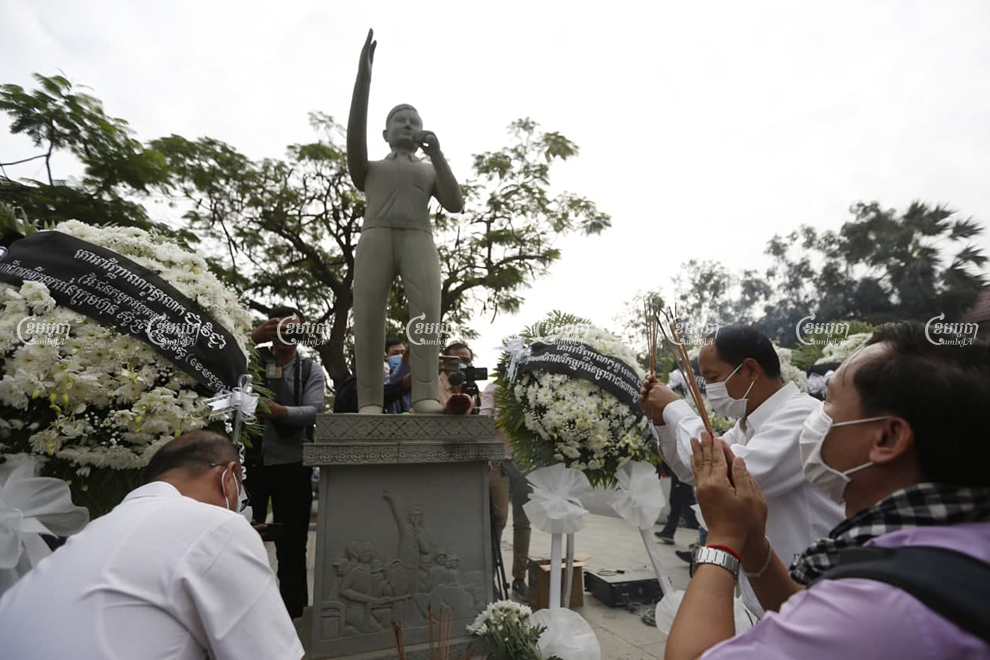Dozens of workers and unionists gathered Friday to mourn the death of Chea Vichea, an outspoken union leader who was assassinated in broad daylight while reading a newspaper at a roadside newsstand outside Wat Langka in 2004.
Just a few meters from where an unmasked gunman fired two shots into Chea Vichea, killing him instantly, members of a worker movement he pioneered called for authorities to track down those behind the brazen murder.
“The government is responsible for finding justice for workers, especially crimes against union leaders, or there will be no justice for the people,” said Ath Thon, president of the Cambodian Labor Confederation.
“We keep calling again and again for authorities to find justice, not only for Chea Vichea but for all.”
As president of the Free Trade Union of Workers in the Kingdom of Cambodia, Chea Vichea was at the forefront of a nascent labour movement being built on the back of mass expansion of the garment industry in Cambodia.
He was a staunch critic of Prime Minister Hun Sen and an ally of now exiled opposition leader Sam Rainsy – and his murder came amid a spate of politically-connected assassinations in Phnom Penh.
Days after Chea Vichea was killed, police arrested two men, Born Samnang and Sok Sam Oeun, but a judge dismissed the case against them for a lack of evidence.
The Phnom Penh Municipal Court overturned that decision and both men were sentenced in 2005 to 20 years jail for the murder before they were exonerated by the Supreme Court and freed in 2013.
Police said it reopened investigations into the murder, but there has been no indication of progress since.
“Chea Vichea’s case is still open and the process of seeking justice and the ongoing investigation remain in place,” Justice Ministry spokesman Chin Malin told CamboJA.
“These so-called ‘perfect crimes’ are common and occur in many countries, including the United States and Europe, where justice is not found after 20 or 30 years,” he said, rejecting claims of impunity that have echoed around the murder since 2004.
Shortly after Chea Vichea’s death, his wife and children fled to Finland, where they have lived since.
Five months after the killing, Ros Sovannareth, a Free Trade Union committee member, was shot dead and, in 2007, Hy Vuthy, a president of the movement at the time, met the same fate.
No one has been held accountable for the killings, which are an example of the impunity that runs rampant in Cambodia’s justice system, said Chak Sopheap, executive director of the Cambodian Center for Human Rights.
“This detrimental culture of impunity robs citizens of their fundamental rights and instills a lack of confidence in the judiciary,” Sopheap said.
“We will not forget Chea Vichea. His case serves as a reminder to the Royal Government of Cambodia and to the public of the importance of accountability, transparency and rule of law to combat impunity and corruption.”
In 2016, Chea Vichea’s brother, Chea Mony, who took control of the Free Trade Union for some years, called for the government to shut down the investigation and stop pretending it was trying to find the killer.
Interior Ministry spokesman Khieu Sopheak said that there were few new leads to follow, with various witnesses having fled the country.
“No one comes to provide testimony and it seems they no longer care about it anymore,” he said. “However, the case is still open.”
National police spokesman Chhay Kim Khoeun declined to comment.
In a park next to Wat Langka, where a small statue of Chea Vichea was erected in 2013 after years of blockages by the government, garment worker Ly Thary lit incense and said the bravery of Chea Vichea would never be forgotten.
“I am here to pay respect and show gratitude to him for fighting for workers’ freedoms,” she said, noting that he was the first union leader to demand a minimum wage.
“We insist on justice for him and his family but it seems that the authorities efforts are useless because its been years and they still have not found the killer,” she said. “Still, we wait and wait.”








